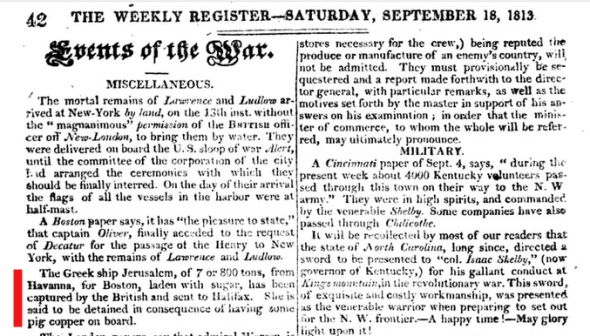How Modern Greek Came to America
Posted: October 1, 2019 Filed under: Archival Research, Biography, Classics, Language Studies, Modern Greek History, Philhellenism | Tags: John Pickering, Nikolaos Tziklitiras, William Jenks 3 CommentsPosted by Curtis Runnels
Curtis Runnels, Professor of Archaeology at Boston University and an expert in Palaeolithic archaeology in Greece, here contributes to From the Archivist’s Notebook a story about how Americans first heard Modern Greek being spoken in the early 19th century. An aficionado of antiquarian shops, Runnels has frequently discovered unique documents of great historical and informational value, such as the four documents presented below, which tell us the story of a Greek merchant, Nikolaos Tziklitiras, who, after landing by accident in Boston in 1813, became the first Greek teacher in town and laid the foundations for the spread of Modern Greek studies in America.
On a late autumn day in 1813 the ship Jerusalem made its way slowly into Boston harbor. She was a long way from home. The 750-ton ship began her journey in Smyrna with a Greek-speaking crew bound for Cuba to take on a cargo of coffee, sugar, copper, and hides for Boston. Unfortunately, things did not go exactly as planned. Contemporary reports in the Niles Weekly Register, a popular news periodical of the day, relate that the Jerusalem was detained in September on her way to Boston by the British on account of the copper ingots in her cargo, and the ship was diverted to Halifax, Nova Scotia. She evidently put into Boston on her way to Canada (“September 18: The Greek Ship Jerusalem”). Now, in November, having sorted out her difficulties with the British authorities, she was at last bringing her cargo to Boston (“November 27: The Greek Ship Jerusalem”).

The news of Jerusalem’s detention as announced in Niles Weekly Register, Sept. 18, 1813.
The arrival of the Jerusalem in Boston was newsworthy because as far as the authorities knew she was the first Greek ship to reach the United States. It was something of a sensation, and members of the public, along with officials, merchants, students, and at least one Harvard College scholar, Edward Everett, flocked to the dock to see the ship. One man in the throng, however, was not interested in the story of her voyage and capture, nor was he interested in her cargo of Cuban sugar and coffee. John Pickering (1777-1846) had come to hear the crew talk.
Schliemann of Troy: The Story of a Linguistic Genius
Posted: April 2, 2015 Filed under: Archaeology, Archival Research, Education, History, History of Archaeology, Language Studies, Women's Studies | Tags: Emil Ludwig, Heinrich Schliemann, Sophia Schliemann 3 CommentsSchliemann the legendary excavator of Troy and Mycenae hardly needs an introduction. A host of publications deal with the last twenty years of his life and the results of his excavations. It is only recently, however, that any interest has been taken in Schliemann’s “non-Greek” past, his early years, when he was a successful merchant, an obsessive traveler, and a compulsive linguist. What else can we call a man who taught himself to read, write, and speak more than fifteen languages? Read the rest of this entry »


